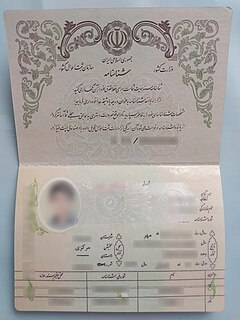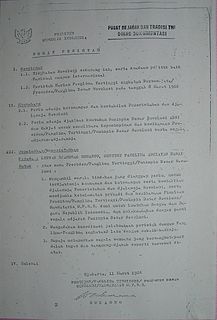 W
WThe Charter of the Forest of 1217 is a charter that re-established for free men rights of access to the royal forest that had been eroded by William the Conqueror and his heirs. Many of its provisions were in force for centuries afterwards. It was originally sealed in England by the young King Henry III, acting under the regency of William Marshall, 1st Earl of Pembroke. It was in many ways a companion document to Magna Carta. The Charter redressed some applications of the Anglo-Norman Forest Law that had been extended and abused by William Rufus.
 W
WA Curfew Pass or Movement and Curfew Pass is a document issued by an empowered authority such as police or military for public officials or civilians to travel within or to and from an area under an imposed curfew by the said authority.
 W
WIdentity documents in Iran are official documents of Iranians identity and citizenship and are used to identification and authentication. From of the most important identity documents in Iran are the Iranian identity booklet and the Iranian identity card. Identity documents for foreign nationals are resident card and employment card.
 W
WThe Kuching Declaration is a declaration in English was adopted by the three component parties of the Pakatan Rakyat coincide with Malaysia Day celebrations on 16 September 2012 held at Chonglin Park, Kuching, Sarawak, the declaration pledge and promise will honour the spirit of the Malaysia Agreement of 1963 to the nations and the peoples of the States of Sarawak and Sabah that when they form the next government of the Malaysia they will honour all its pledges and promises in this declaration.
 W
WDiplomatic correspondence is correspondence between one state and another and is usually of a formal character. It follows several widely observed customs and style in composition, substance, presentation, and delivery and can generally be categorized into letters and notes.
 W
WThe Proclamation of Malaysia was a statement, written in English and Malay, that declared the merger of the Federation of Malaya with the British crown colonies of North Borneo, Sarawak and Singapore into the new Federation of Malaysia, following the enactment of the Malaysia Agreement and the Malaysia Act 1963 that July. The merger came into effect on 16 September 1963, and the proclamation was delivered on that date by Prime Minister Tunku Abdul Rahman in the Stadium Merdeka in Kuala Lumpur.
 W
WThe Rekidai Hōan (歴代宝案), Precious Documents of Successive Generations, is an official compilation of diplomatic documents of the royal government of the Ryūkyū Kingdom. Covering the period from 1424 to 1867, it contains records, written entirely in Chinese, of communications between Ryukyu and ten different trading partners in this period, detailing as well the gifts given in tribute. The ten countries or trading ports are China, Korea, Siam, Malacca, Palembang, Java, Sumatra, Pattani, and Sunda Kelapa (Jakarta). There are 242 volumes in total, including four lists, and an extra four sections.
 W
WThe Supersemar, the Indonesian abbreviation for Surat Perintah Sebelas Maret, was a document signed by the Indonesian President Sukarno on 11 March 1966, giving the army commander Lt. Gen. Suharto authority to take whatever measures he "deemed necessary" to restore order to the chaotic situation during the Indonesian mass killings of 1965–66. The abbreviation "Supersemar" is a play on the name of Semar, the mystic and powerful figure who commonly appears in Javanese mythology including wayang puppet shows. The invocation of Semar was presumably intended to help draw on Javanese mythology to lend support to Suharto's legitimacy during the period of the transition of authority from Sukarno to Suharto.
 W
WA war diary is a regularly updated official record kept by military units of their activities during wartime. The purpose of these diaries is to both record information which can later be used by the military to improve its training and tactics as well as to generate a detailed record of units' activities for future use by historians. War diaries are focused on the administration and operations of the unit they cover, and generally do not contain information about individual personnel.
 W
WIn environmental policy, white certificates are documents certifying that a certain reduction of energy consumption has been attained. In most applications, the white certificates are tradable and combined with an obligation to achieve a certain target of energy savings. Under such a system, producers, suppliers or distributors of electricity, gas and oil are required to undertake energy efficiency measures for the final user that are consistent with a pre-defined percentage of their annual energy deliverance. If energy producers do not meet the mandated target for energy consumption they are required to pay a penalty. The white certificates are given to the producers whenever an amount of energy is saved whereupon the producer can use the certificate for their own target compliance or can be sold to (other) parties who cannot meet their targets. Quite analogous to the closely related concept of emissions trading, the tradability in theory guarantees that the overall energy saving is achieved at least cost, while the certificates guarantee that the overall energy saving target is achieved.